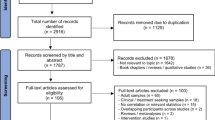Abstract
This study examined the sensitivity of the Anxiety Disorder Interview Schedule IV (ADIS-IV) in detecting potentially traumatic childhood abuse experiences in a sample of 50 consecutive adult anxiety disorder patients. Of 13 patients who reported traumatic childhood maltreatment experiences using a behaviorally specific abuse history questionnaire, seven failed to report these experiences during the ADIS-IV interview (a sensitivity of 46%). Findings suggest that the two omnibus gating questions on the ADIS-IV may be insufficient in capturing exposure to certain traumatic events, as stipulated by Diagnostic and Statistical Manual diagnostic criteria for a diagnosis of post-traumatic stress disorder (PTSD). This potential for under identification of trauma history suggests that caution is warranted regarding the use of the ADIS-IV to screen for self-reported trauma exposure in adult outpatients. Alternatives, including the use of PTSD-specific interviews and supplemental trauma event checklists, are discussed.
Similar content being viewed by others
References
American Psychiatric Association. (1994). Diagnostic and statistical manual of mental disorders (4th ed.). Washington, DC: Author.
American Psychiatric Association. (2000). Diagnostic and statistical manual of mental disorders (4th ed., text revision). Washington, DC: Author.
Blake, D. D., Weathers, F. W., Nagy, L. M., Kaloupek, D. G., Gusman, F. D., Charney, D. S., & Keane, T. M. (1995). The development of a clinician-administrated PTSD scale. Journal of Trauma Stress, 8, 75–90.
Brown, T. A. & Barlow, D. H. (2001). Classification of anxiety and mood disorders. In Anxiety and its disorders: The nature and treatment of anxiety and panic (2nd ed., pp. 292–327). New York: Guilford Press.
Brown, T. A., Di Nardo, P. A., & Barlow, D. H. (1994). Anxiety Disorders Interview Schedule for DSM-IV (ADIS-IV). San Antonio, TX: Psychological Corporation/Graywind Publications Incorporated.
Brown, T. A., Di Nardo, P. A., Lehman, C. L., & Campbell, L. A. (2001). Reliability of DSM-IV anxiety and mood disorders: Implications for classification of emotional disorders. Journal of Abnormal Psychology, 110, 49–58.
Di Nardo, P. A., Moras, K., Barlow, D. H., Rapee, R. M., & Brown, T. A. (1993). Reliability of the DSM-III-R anxiety disorder categories using the Anxiety Disorders Interview Schedule-Revised (ADIS-R). Archives of General Psychiatry, 50, 251–256.
Franklin, A. L., Sheeran, T., & Zimmerman, M. (2002). Screening for trauma histories, posttraumatic stress disorder (PTSD), and subthreshold PTSD in psychiatric outpatients. Psychological Assessment, 14, 467–472.
Goodman, L. A., Corcoran, C., Turner, K., Yuan, N., & Green, B. L. (1998). Assessing traumatic event exposure: General issues and findings for the Stressful Life Events Screening Questionnaire. Journal of Traumatic Stress, 11, 521–542.
Green, B. L. (1996). Trauma history questionnaire. In B. H. Stamm (Ed.), Measurement of stress, trauma, and adaptation (pp. 366–369). Lutherville, MD: Sidran Press.
Helzer, J. E., Robins, L. N., Croughan, J. L., & Welner, A. (1981) Renard diagnostic interview. Its reliability and procedural validity with physicians and lay interviewers. Archives of General Psychiatry, 38, 393–398.
Higgins, D. J., & McCabe, M. P. (2001). The development of the Comprehensive Child Maltreatment Scale. Journal of Family Studies, 7, 7–28.
Lehmann, P. (2000). Posttraumatic stress disorder (PTSD) and child witnesses to mother-assault: A summary and review. Children and Youth Services Review, 22, 275–306.
Malinosky-Rummell, R. & Hansen, D. J. (1993). Long-term consequences of childhood physical abuse. Psychological Bulletin, 114, 68–79.
Polusny, M. M., & Follette, V. M. (1995). Long-term correlates of childhood sexual abuse: Theory and empirical findings. Applied and Preventive Psychology, 4, 143–166.
Resnick, H. S., Falsetti, S. A., Kilpatrick, D. G., & Freedy, J. R. (1996). Assessment of rape and other civilian trauma-related post-traumatic stress disorder: Emphasis on assessment of potentially traumatic events. In T. W. Miller (Ed.), Stressful life events (pp. 231–266). Madison: International Universities Press.
Sanders, B., & Becker-Lausen, E. (1995). The measurement of psychological maltreatment: Early data on the child abuse and trauma scale. Child Abuse and Neglect, 19, 315–323.
Spitzer, R. L., Williams, J. B. W., Gibbon, M., & First, M. B. (1992). The Structured Clinical Interview for DSM-III-R: I. History, rationale and description. Archives of General Psychiatry, 49, 624–629.
Weaver, T. L. (1998). Method variance and sensitivity screening for traumatic stressors. Journal of Traumatic Stressy, 11, 181–185.
Wrighte, P. M., Lichtenfels, P. A., & Pursell, E. D. (1989). The structured interview: Additional studies and a meta-analysis. Journal of Occupational Psychology, 62, 191–200.
Author information
Authors and Affiliations
Corresponding author
Rights and permissions
About this article
Cite this article
DiLillo, D., Hayes, S.A. & Hope, D.A. Sensitivity of the Anxiety Disorder Interview Schedule IV in Detecting Potentially Traumatic Childhood Maltreatment. J Psychopathol Behav Assess 28, 131–135 (2006). https://doi.org/10.1007/s10862-006-7491-9
Accepted:
Issue Date:
DOI: https://doi.org/10.1007/s10862-006-7491-9




